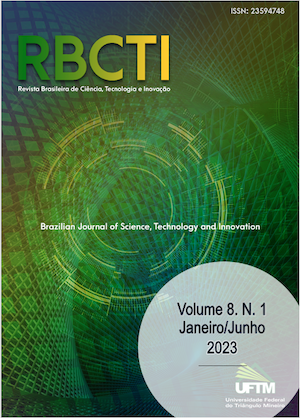The current Brazilian energy model: 2016 to 2020
DOI:
https://doi.org/10.18554/rbcti.v8i1.6584Palavras-chave:
Brazil, Sustainable Development, Energy, Renewable EnergyResumo
Power production growth in Brazil is a reality. Therefore, it is necessary carrying out analyses about energy sources to achieve sustainable and feasible development. A country with huge hydroelectric potential has the production of clean energy in comparison to other energy sources as positive feature. Observing the power generation sector’s origin, and comparing and understanding its dynamics, are duties of both the State and the community. The aim of the review in the present article is to objectively understand the Brazilian energetic potential and its several sources. Accordingly, a bibliographic review was conducted to better understand the Brazilian energetic scenario. Brazil accounts for the biggest biodiversity on the planet, as well as for having great climatic variety, such as equatorial, tropical and altitude tropical, sub-tropical, semiarid and Atlantic tropical climate. Brazilian power supply is in the hands of big power plants, like hydroelectric, thermo-electric, wind and solar plants. Hydroelectric plants correspond to approximately 59% of the country’s total installed capacity; moreover, it is often presented as clean and renewable energy source. Yet, although there is much to be developed when it comes to the sustainability of the hydroelectric source, it remains as the most feasible and cleanest Brazilian energy channel.
Referências
ABEEÓLICA. Associação Brasileira de Energia Eólica. Boletim anual 2021. Available at: https://abeeolica.org.br/energia-eolica. Accessed on: 2022 Dec. 20.
ABRANCHES, S. Biological megadiversity as a tool of soft power and development for Brazil. Brazilian Political Science Review, v. 14, 2020. DOI: https://doi.org/10.1590/1981-3821202000020006
ANEEL. Agência Nacional de Energia Elétrica. Ministério de Minas e Energia. Relatórios: 2016, 2017, 2018, 2019 e 2020. Available at: https://www.gov.br/aneel/pt-br. Accessed on: 2022 Dec. 20.
BHATIA, S. K.; PALAI, A. K.; KUMAR, A.; BHATIA, R. K.; PATEL, A. K.; THAKUR, V. K.; YANG, Y. H. Trends in renewable energy production employing biomass-based
biochar. Bioresource Technology, v. 340, n. 125644, 2021.
BELANÇON, M. P. Brazil electricity needs in 2030: Trends and challenges. Renewable Energy Focus, p. 89-95, 2021. DOI: https://doi.org/10.1016/j.ref.2021.01.001
BRASIL. Constituição da República Federativa do Brasil para que o acesso à energia elétrica seja direito social. Proposta de Emenda à Constituição n° 44. 2017.
CARSTENS, D. D. S.; CUNHA, S. K. Challenges and opportunities for the growth of solar photovoltaic energy in Brazil. Energy Policy, v. 125, p. 396-404, 2019. DOI: https://doi.org/10.1016/j.enpol.2018.10.063
DELAPEDRA - SILVA, V. A. The different characteristics of real options in contracts of wind power in Brazil. Gestão & Produção, v. 28, 2021. DOI: https://doi.org/10.1590/1806-9649-2021v28e5652
DIÓGENESA, J. R. F.; CALOR, J.; RODRIGUES, J. C. Barriers to onshore wind farm implementation in Brazil. Energy Policy, v. 128, p. 253-266, 2019. DOI: https://doi.org/10.1016/j.enpol.2018.12.062
EPE. Energia de Pesquisa Energética. Expansão da Geração, 2021. Available at: https://www.epe.gov.br/pt/areas-de-atuacao/energia-eletrica/expansao-da-geracao/fontes. Accessed on: 2022 Dec. 20.
FERREIRA, L. F.; SANTANA, J. R. D.; RAPINI, M. S.; MOURA, F. R. D. Financiamento à pesquisa em energia renovável no Brasil: uma análise a partir do Fundo Setorial de Energia. Nova Economia, v. 32, p. 505-537, 2022.
GONZÁLEZ, M. O. A.; GONÇALVES, J. S.; VASCONCELOS, R. M. Desenvolvimento sustentável: estudo de caso na implantação de energia renovável no Brasil. Journal of Cleaner Production, v. 142, p. 461-475. 2017.
HUNT, J. D.; STILPEN, D.; DE FREITAS, M. A. V. A review of the causes, impacts and solutions for electricity supply crises in Brazil. Renewable and Sustainable Energy Reviews, p. 208-222, 2018. DOI: https://doi.org/10.1016/j.rser.2018.02.030
IBGE. Instituto Brasileiro de Geografia e Estatística. Domicílios Brasileiros. 2019.
IEA. International Energy Agency. Total energy supply: Central e South America. 2019.
IPEA. Instituto de Pesquisa Econômica Aplicada. Assegurar o acesso confiável, sustentável, moderno e a preço acessível à energia para todos. 2018.
KUMARI, S.; DAS, D. Biohythane production from sugarcane bagasse and waterhyacinth: A way towards promising green energy production. Journal of cleaner production, v. 207, p. 689-701, 2019. DOI: https://doi.org/10.1016/j.jclepro.2018.10.050
MAESTRI, C. O. N. M.; ANDRADE, M. E. M. C. Priorities for tariff compensation of distributed electricity generation in Brazil. Utilities Policy, 2022. DOI: https://doi.org/10.1016/j.jup.2022.101374
NASCIMENTO, M. C. B.; FREIRE, E. P.; DANTAS, F. D. A. S.; GIANSANTE, M. B. Estado da arte dos aterros de resíduos sólidos urbanos que aproveitam o biogás para geração de energia elétrica e biometano no Brasil. Engenharia Sanitária e Ambiental, v. 24, p. 143-155, 2019. DOI: https://doi.org/10.1590/S1413-41522019171125
OLIVEIRA, N. C. C. A grande aceleração e a construção de barragens hidrelétricas no Brasil. Varia História, v. 34, p. 315-346. 2018. DOI: https://doi.org/10.1590/0104-87752018000200003
PERERA, F. Pollution from fossil-fuel combustion is the leading environmental threat to global pediatric health and equity: Solutions exist. International Journal of Environmental Research and Public Health, v.15, p.16, 2017. DOI: https://doi:10.3390/ijerph15010016
PEREIRA JR, A. O.; PEREIRA, A. S.; LA ROVERE, E. L.; DE LIMA BARATA, M. M.; DE CASTRO VILLAR, S.; PIRES, S. H. Strategies to promote renewable energy in Brazil. Renewable and sustainable energy reviews, v. 15, n. 1, p. 681-688. 2011. DOI: https://doi.org/10.1016/j.rser.2010.09.027
REN, G.; LIU, J.; WAN, J.; GUO, Y.; YU, D. Overview of wind power intermittency: Impacts, measurements, and mitigation solutions. Applied Energy, v. 204, p. 47-65, 2017. DOI: https://doi.org/10.1016/j.apenergy.2017.06.098
TERRIN, K. A. P.; BLANCHET, L. A. Direito de energia e sustentabilidade: uma análise dos impactos negativos das usinas hidrelétricas no Brasil. Revista Virede, p. 47-63, 2019. DOI: https://doi.org/10.30612/videre.v11i22.11215
VIEIRA, F.V.; VERÍSSIMO, M. P. Crescimento econômico em economias emergentes selecionadas. Economia e Sociedade, v. 18, p. 513-546, 2009. DOI: https://doi.org/10.1590/S0104-06182009000300004
Downloads
Publicado
Edição
Seção
Licença
Copyright (c) 2023 Larielly Regina Santos Silva, Teresa Cruvinel de Sousa Mello , Mário Sérgio da Luz

Este trabalho está licenciado sob uma licença Creative Commons Attribution-NonCommercial-ShareAlike 4.0 International License.






